Entities in Local SEO: Your Ultimate Guide to Local Ranking Success
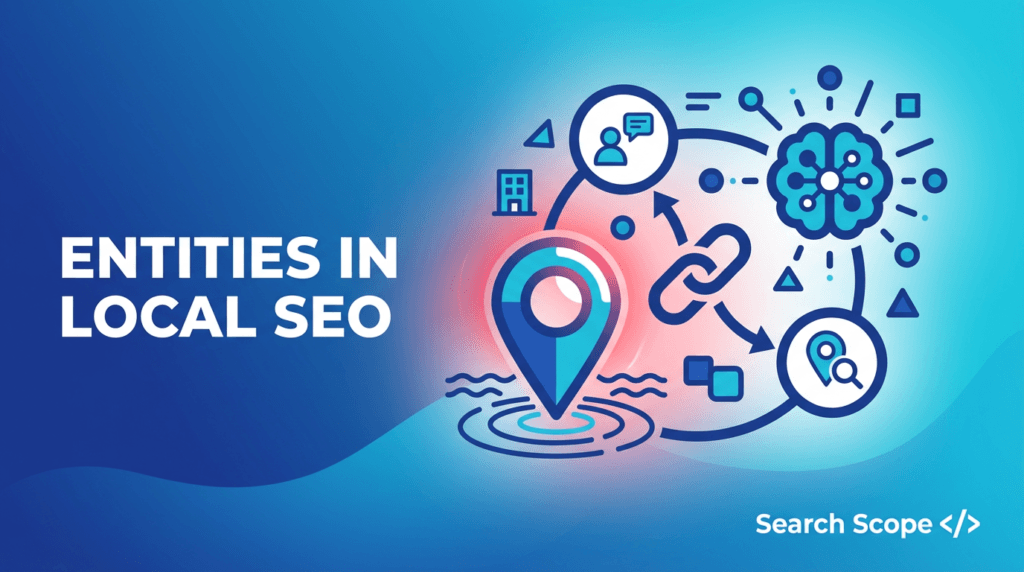
Last Updated on 27 January 2026 by Dorian Menard
Entities are like tags that help search engines, such as Google, understand your local business.
They are things or concepts—like a person, place, or idea – that Google uses to give relevant search results.
Entity-based SEO is pivotal in 2026 as Google increasingly relies on understanding entities over keywords. This shift is crucial for businesses seeking visibility in local search results. Stay ahead by aligning your SEO strategy with Google’s latest algorithms.
Key Takeaways
- Entities are distinct “things” that Google recognises – people, places, businesses, or concepts that define your local relevance
- Entity SEO helps Google understand the true context and relationships within your local business ecosystem
- 72% of consumers use Google to search for local business information
- Google’s Knowledge Graph connects entity relationships to deliver more accurate local search results
- Structured data and schema markup are essential for entity recognition
What are Entities?
Definition and Core Concepts of Entity SEO
In simple terms, an entity in SEO is a specific thing with a specific meaning that Google can recognize as that thing. You can think of an entity as Google’s way of classifying concepts in the real world under which are are able to collect and include information.
An entity is referred to herein as “a thing or concept in which we may have information that may be unique, singular, well-defined and distinguishable” (Google patent).
That can be as diverse as the name of your business, a local landmark, a common service you provide or even something vague like “back pain treatment” or “emergency plumber”.
How Google Defines SEO Entities
Recent Google patents reveal new depths of advancement in entity identification. Google’s algorithms now take into account how entities relate, rather than just keywords that match. This change brings more context around local businesses and how they relate to geographic locations, services, and consumer needs.
Entities in your content are logged and mapped to Google’s Knowledge Graph a massive interconnect database of knowledge that powers search results, with the aid of Natural Language Processing (NLP) systems.
Types of Local SEO Entities
There are many different entities, from big to small! Some types of entities related to local businesses are:
Geographic Entities
- Your city, suburb, or service areas (Perth, Subiaco, Fremantle)
- Local landmarks (Kings Park, Swan River, Perth CBD)
- Street names and postcodes
Business-Related Entities
- Your business name and brand
- Services you provide (SEO, digital marketing, web design)
- Industry classifications and categories
Industry-Specific Entities
- Technical terms relevant to your field
- Professional certifications or qualifications
- Industry associations and memberships
Community and Event Entities
- Local events you sponsor or attend
- Community organisations you support
- Awards and recognition received
| Entity Type | Description | Examples |
|---|---|---|
| Geographic Entities | Physical locations and landmarks | Perth, Fremantle, Kings Park, Swan River |
| Business Entities | Your business name, services, and category | Search Scope, SEO services, marketing agency |
| Industry Entities | Terms specific to your sector | Schema markup, Chiropractic adjustment, Family law |
| Community Entities | Local organisations, events, and awards | Subiaco Farmers Market, Perth Business Awards |
| Team/People Entities | Individuals associated with the business | Stephen Becker (owner), marketing manager, receptionist |
The Role of Knowledge Graphs
Knowledge Graph by Google is strong entity-based search. Google doesn’t just match keywords when you type “SEO agency Perth”, it knows the entities that make up that query:
“SEO” as a service entity
“Agency” like a type of business.
“Perth” as a geographic entity
Knowledge Graph then links those entities into local businesses in play, factoring in things like distance, relevance and prominence.
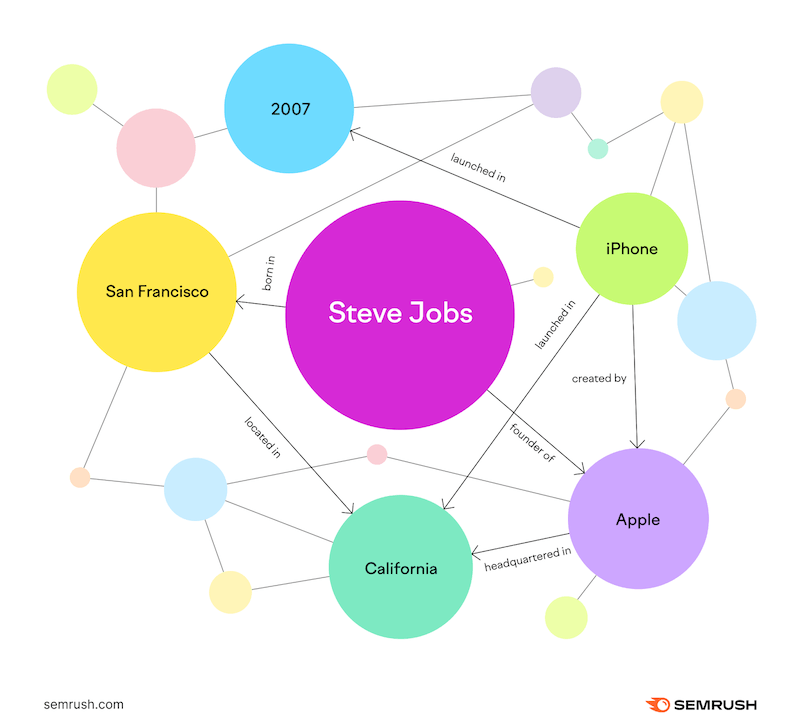
This focus on entities has changed how Google finds and shows search results. Since voice search is growing, people now make longer search queries.
This creates more entities within a sentence, helping Google work out exactly what the user needs, with no need for long lists of multiple pages.
How Entities Improve Local Search Rankings
Understanding Entity-Based vs Keyword-Based SEO
Traditional SEO focused on matching specific keywords. Entity-based SEO focuses on the concepts and relationships behind those keywords.
For example, instead of just targeting “Perth SEO company”, entity-based optimisation considers:
- Perth as a geographic entity with suburbs, landmarks, and local business ecosystem
- Your business as an entity connected to Perth
- SEO as a service entity with related concepts (digital marketing, search engine optimisation, online visibility)
Connection Between Entities and Search Intent
Voice searches and conversational search result in more complex and longer searches with multiple entities. Google uses these entity relationships to understand what a user is looking for.
Impact on Local Search Visibility
Using relevant entities in your content and implementing proper schema markup makes your business information crystal clear to Google’s algorithms. This directly impacts:
- AI Overview appearances (Google’s new AI-powered search feature)
- Local pack rankings (the top 3 local results)
- Google My Business visibility
- Organic search rankings for local queries
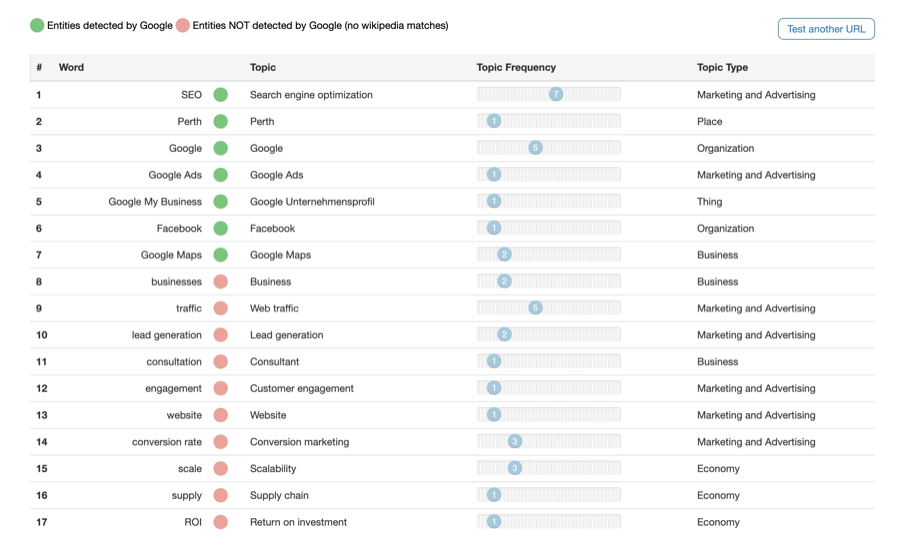
So you need to add related entities or multiple entities to your content wherever possible. Entities create relevant search results much more than any local keyword research. When optimising for entities, you’re preparing for the future of entities in local marketing.
Building Local Relevance Through Entities
When Google’s bot crawls your website, it checks data from all over the web such as your Google My Business profile. It checks what people say. It checks for awards. It checks your local SEO.
All this online buzz helps Google rank you, especially as a local business. Want more people to see you?
Work on getting relevant entities, your key entities across as wide an online presence as possible and as much organic traffic as possible, not simply aiming for the best SEO in Perth but also the most visibility as a local business.
Essential Local Entities
- Geographic Entities: These are places. Think London Eye or even just your address!. Local landmarks can be very helpful!
- Business-Related Entities: What do you sell? Chiropractor? Back pain help? These are key!
- Industry-Specific Entities: Say you fix injuries. That’s an industry-specific entity!
- Community and Event Entities: Do you go to local events? These can be entities too and really boost your local relevance. Using the right entities here shows you understand how Google ranks entities, a key aspect of modern SEO.
Finding and Mapping Local Entities
Tools for Entity Detection
Google’s Natural Language API (https://cloud.google.com/natural-language) – Identifies entities within your content and measures their prominence.
TextRazor – Advanced entity extraction and sentiment analysis for content optimisation.
InLinks – Specialised entity SEO tool that helps identify and optimise for relevant entities.
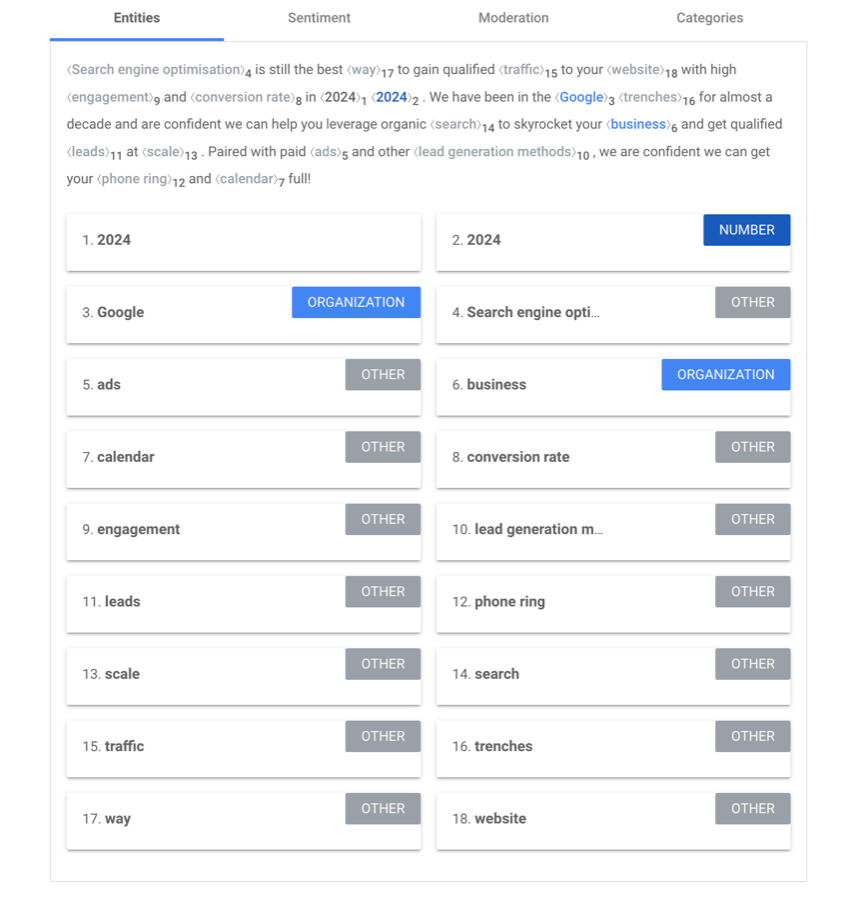
Entity Research Process
- Analyse competitor entities – What entities do top-ranking Perth SEO agencies use?
- Identify local entity gaps – Which Perth-specific entities are your competitors missing?
- Map entity relationships – How do your services connect to local entities?
- Prioritise high-value entities – Focus on entities with strong local search volume
Creating Entity Maps for Local Businesses
Map your core entities to specific pages and content:
- Homepage: Business name + Perth + primary services
- Service pages: Specific services + Perth suburbs + related entities
- About page: Team names + qualifications + local connections
- Blog content: Industry entities + local examples + case studies
Implementing Entity Optimisation
Content Creation with Local Entities
Create entity-rich content that demonstrates local expertise:
- “Top 10 Perth Suburbs for Small Business Growth”
- “How Perth Businesses Can Leverage Local SEO”
- “Why Choose a Perth-Based SEO Agency”
Include natural mentions of local entities throughout your content, not just in titles and headers.
Internal Linking Strategy
Use entity-rich anchor text for internal links:
- Link “Perth SEO services” to your services page
- Connect “local businesses in Fremantle” to relevant case studies
- Use “Google My Business optimisation Perth” for GMB service pages
Entity-Rich Landing Pages
Create dedicated pages for high-value entity combinations:
“Local SEO for Medical Practices Perth” – service + industry + location entities
“SEO Services Subiaco” – targeting geographic + service entities
“Digital Marketing for Perth Restaurants” – industry + location entities
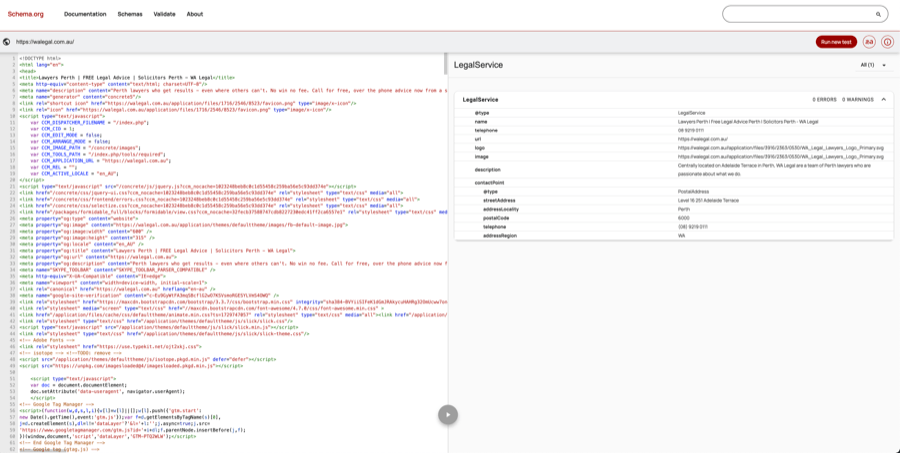
Schema Markup and Structured Data
| Schema Type | Page Type | Purpose |
|---|---|---|
| LocalBusiness | Homepage, contact page | Provides location, opening hours, and business identity to Google |
| Service | Service-specific pages | Defines the services offered and their relation to local areas |
| FAQPage | FAQ or service explanation | Enhances visibility via rich results in local SERPs |
| Person | About/team pages | Establishes owner or expert identity as an entity |
| Event | Community sponsorship or events | Highlights local event participation for entity relevance |
LocalBusiness Schema Implementation
Use LocalBusiness schema on your site. It tells Google your opening times, address, and more! Your local business simply must have it. It is how you really optimise your online presence.
{
"@context": "https://schema.org",
"@type": "LocalBusiness",
"name": "Search Scope",
"address": {
"@type": "PostalAddress",
"streetAddress": "Unit 1/48 McMillan Street",
"addressLocality": "Victoria Park",
"addressRegion": "WA",
"postalCode": "6100",
"addressCountry": "AU"
},
"geo": {
"@type": "GeoCoordinates",
"latitude": "-31.9505",
"longitude": "115.8605"
},
"telephone": "0422 428 584",
"openingHours": ["Mo-Th 09:30-16:30", "Fr 09:30-15:00"],
"sameAs": [
"https://www.facebook.com/searchscope",
"https://www.linkedin.com/company/searchscope"
]
}Validate your schema using Google’s Rich Results Test (https://search.google.com/test/rich-results).
Service Schema Usage
For each service you offer, implement Service schema:
- SEO services with Perth-specific service areas
- SEO with suburb-level targeting
- Digital marketing services with industry specialisations
FAQ Schema Benefits
Implement FAQ schema for common local business questions:
“Which Perth suburbs do you service?”
“What makes Perth SEO different from national SEO?”
“How long does local SEO take to show results in Perth?”
Building Entity Authority
Citations and Digital References
Citations and Digital References
- Build consistent entity mentions across:
- News mentions: Perth Business News, local publications
- Local directories: Yellow Pages, True Local, Yelp Australia
- Industry directories: Clutch, DesignRush, SEO agency listings
- Local business associations: Perth Chamber of Commerce
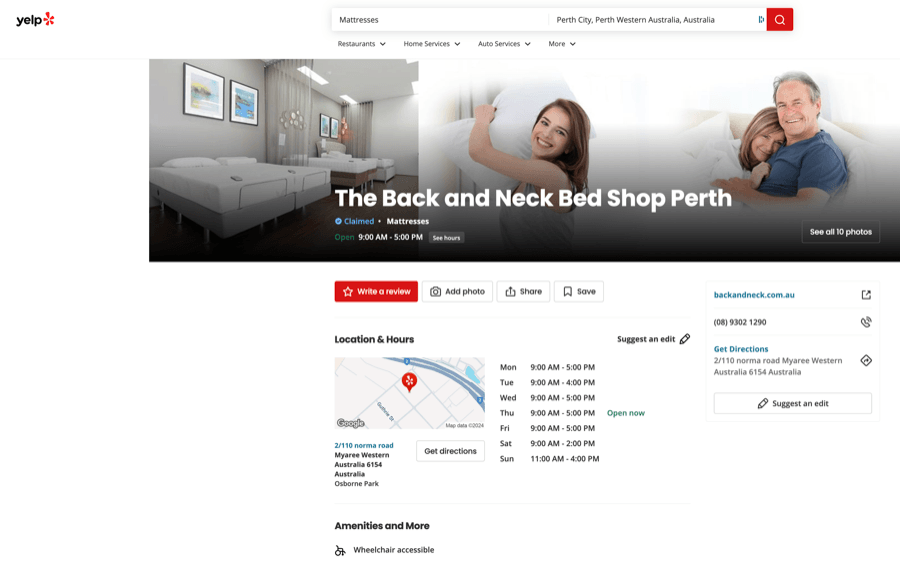
Local Press and Media Coverage
Secure coverage in Perth-based media:
- Sponsorship announcements in local media
- Guest articles in Perth Business News
- Interviews on local radio stations
- Speaking at Perth business events
Community Involvement
Demonstrate local entity connections through:
- Local business partnerships
- Perth business networking events
- Local charity sponsorships
- Community event participation
Awards and Recognition
Pursue Perth-specific recognition:
- Client testimonials mentioning Perth success
- Perth Business Awards nominations
- Local chamber of commerce awards
- Industry association recognition
Entity-Based Content Strategy
Creating Entity-Rich Blog Posts
Write blog posts with different entities, and aim for interlinking across your pages wherever you see a match.

Local Landing Pages
Make pages for each area you work in, such as your West Perth treatment page. These are vital local SEO-ranking factors.
Service Area Pages
List all the areas you work in, with links, showing Google just how local you really are!. These are excellent SEO tactics for any local business. This also helps with Google Maps Optimisation.
About Us and Team Pages
Tell Google who you are! Even the owner’s name, Stephen Becker, can be an entity. The importance of entities cannot be overstated and you can be certain that SEO experts are using every possible advantage within this seo space.
| Page Type | Entities to Include | Example Implementation |
|---|---|---|
| Homepage | Business name, city, service category | “Search Scope – Local SEO Agency in Perth” |
| Service Pages | Service, suburb, industry terms | “SEO for Dentists in Subiaco” |
| About Page | Team members, qualifications, city | “Stephen Becker, Perth-based SEO expert since 2014” |
| Blog Articles | Industry concepts + local references | “How Perth Chiropractors Can Improve Google Rankings” |
| Location Pages | Suburb, service, landmarks | “Digital Marketing Services Near Kings Park, West Perth” |
Advanced Entity Optimisation Strategies
Multi-Location Businesses
For businesses serving multiple Perth areas:
- Create location-specific pages for each suburb
- Implement LocalBusiness schema for each location
- Build suburb-specific content and citations
- Target location + service entity combinations
Service Area Businesses
If you service all of Perth:
- List all service areas in schema markup
- Create suburb-specific landing pages
- Build content around “SEO services [suburb name]”
- Target “near me” searches with location-specific content
Industry-Specific Entity Targeting
Tailor entity strategies by industry:
- Retail: Product entities + Perth shopping areas + retail terms
- Healthcare: Medical terms + Perth suburbs + healthcare entities
- Legal: Legal services + Perth courts + law firm entities
A good first step and a highly recommended one is having an SEO Agency create, refine and further develop your overall SEO strategies, but it would be worth your while investigating.
Future of Entities in SEO
AI and Entity Understanding
As AI becomes more sophisticated, entity relationships will become even more important. Google’s AI Overview feature already prioritises content with clear entity relationships and authoritative local connections.
Voice Search and Entities
Voice searches are becoming more conversational and entity-rich. Optimising for entity relationships prepares your business for voice search dominance.
Local AI Search Features
New AI-powered local search features will rely heavily on entity understanding. Businesses with strong entity optimisation will benefit from enhanced visibility in these new search experiences.
AI generative engine services can put your website and business in the right sources.
Measuring Entity SEO Success
Track your entity optimisation progress through:
- AI Overview appearances for local searches
- Local pack rankings for entity-rich keywords
- Google My Business insights showing entity-related searches
- Organic traffic from long-tail, entity-rich queries
- Click-through rates on entity-optimised content
For ecommerce sites, measure entity optimisation progress through:
- AI Overview appearances for category and product-related searches
- Organic rankings for entity-rich product attributes (brand + colour + size)
- Google Merchant Center insights showing impressions for product entities
- Organic traffic from long-tail, entity-driven product queries
- Click-through rates on entity-optimised product and category pages will help boost ecommerce SEO performance
Conclusion
2026 marks a critical year for SEO professionals to adapt to Google’s evolving focus on entities. By proactively updating strategies and embracing entity-based SEO, businesses can secure a competitive edge in local search results.
Entity optimisation isn’t just the future of SEO – it’s the present reality. Google’s algorithms are already prioritising businesses that demonstrate clear entity relationships and local relevance.
To dominate Perth’s competitive SEO landscape:
- Map your business entities to local Perth connections
- Implement comprehensive schema markup
- Create entity-rich content that serves local search intent
- Build authoritative local citations and mentions
- Monitor and adapt to Google’s evolving entity understanding
The businesses that master entity SEO today will own the local search results tomorrow.